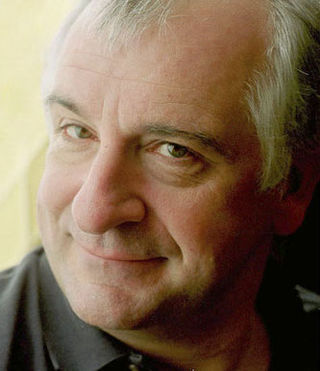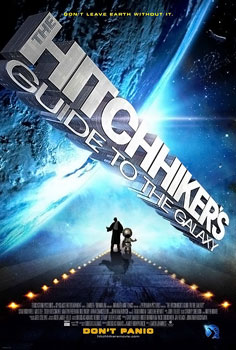Related Research Articles

Douglas Noel Adams was an English author, humorist, and screenwriter, best known for The Hitchhiker's Guide to the Galaxy (HHGTTG). Originally a 1978 BBC radio comedy, The Hitchhiker's Guide to the Galaxy developed into a "trilogy" of five books that sold more than 15 million copies in his lifetime. It was further developed into a television series, several stage plays, comics, a video game, and a 2005 feature film. Adams's contribution to UK radio is commemorated in The Radio Academy's Hall of Fame.

The Hitchhiker's Guide to the Galaxy is a comedy science fiction franchise created by Douglas Adams. Originally a 1978 radio comedy broadcast on BBC Radio 4, it was later adapted to other formats, including novels, stage shows, comic books, a 1981 TV series, a 1984 text adventure game, and 2005 feature film.
Science fiction comedy or comic science fiction is a subgenre of science fiction or science fantasy that exploits the science fiction genre's conventions for comedic effect. Comic science fiction often mocks or satirizes standard science fiction conventions, concepts and tropes – such as alien invasion of Earth, interstellar travel, or futuristic technology. It can also satirize and criticize present-day society.

So Long, and Thanks for All the Fish is the fourth book of the Hitchhiker's Guide to the Galaxy "trilogy of six books" written by Douglas Adams. Its title is the message left by the dolphins when they departed Planet Earth just before it was demolished to make way for a hyperspace bypass, as described in The Hitchhiker's Guide to the Galaxy. A song of the same name was featured in the 2005 film adaptation of The Hitchhiker's Guide to the Galaxy.

The Hitchhiker's Guide to the Galaxy: The Original Radio Scripts is a book, published in 1985, containing the scripts for the original radio series version of The Hitchhiker's Guide to the Galaxy by Douglas Adams.

The Eagles are an American rock band formed in Los Angeles in 1971. With five number-one singles and six number-one albums, six Grammy Awards and five American Music Awards, the Eagles were one of the most successful musical acts of the 1970s in North America and are one of the world's best-selling bands, having sold more than 200 million records worldwide, including 100 million sold in the US alone. They were inducted into the Rock and Roll Hall of Fame in 1998 and were ranked number 75 on Rolling Stone's 2004 list of the "100 Greatest Artists of All Time". Founding members Glenn Frey, Don Henley, Bernie Leadon, and Randy Meisner were recruited by Linda Ronstadt as band members, some touring with her, and all playing on her third solo album, before venturing out on their own on David Geffen's new Asylum Records label.

The Hitchhiker's Guide to the Galaxy is the first book in the Hitchhiker's Guide to the Galaxy comedy science fiction "trilogy of five books" by Douglas Adams, with a sixth book written by Eoin Colfer. The novel is an adaptation of the first four parts of Adams's radio series of the same name, centering on the adventures of the only man to survive the destruction of Earth; while roaming outer space, he comes to learn the truth behind Earth's existence. The novel was first published in London on 12 October 1979. It sold 250,000 copies in the first three months.

The Hitchhiker's Guide to the Galaxy is a 2005 science fiction comedy film directed by Garth Jennings, based upon previous works in the media franchise of the same name, created by Douglas Adams. It stars Martin Freeman, Sam Rockwell, Mos Def, Zooey Deschanel, Bill Nighy, Anna Chancellor, John Malkovich, and the voices of Stephen Fry, Helen Mirren, Thomas Lennon, Richard Griffiths, Ian McNeice, Bill Bailey and Alan Rickman. Adams co-wrote the screenplay with Karey Kirkpatrick but died in 2001, before production began; the film is dedicated to Adams. The film received positive reviews from many critics and grossed over $100 million worldwide.

One of These Nights is the fourth studio album by American rock band the Eagles, released on June 10, 1975. The album was the band's commercial breakthrough, transforming them into international superstars. In July that year, the record became the Eagles' first number one album on Billboard Top LPs & Tape chart, yielding three Top 10 singles: "One of These Nights", "Lyin' Eyes" and "Take It to the Limit". Its title song is the group's second number one single on the Billboard Hot 100. The album sold four million copies and received a Grammy nomination for Album of the Year. A single from the album, "Lyin' Eyes", was also nominated for Record of the Year, and won the Eagles' first Grammy for Best Pop Performance by a Duo or Group with Vocals at the 18th Annual Grammy Awards in 1976. The band embarked on the worldwide One of These Nights tour to promote the album.
The Hitchhiker's Guide to the Galaxy is a comic science fiction series created by Douglas Adams that has become popular among fans of the genre and members of the scientific community. Phrases from it are widely recognised and often used in reference to, but outside the context of, the source material. Many writers on popular science, such as Fred Alan Wolf, Paul Davies, and Michio Kaku, have used quotations in their books to illustrate facts about cosmology or philosophy.

Bernard Matthew Leadon III is an American singer, musician, songwriter, and founding member of the Eagles, for which he was inducted into the Rock and Roll Hall of Fame in 1998. Prior to the Eagles, he was a member of three country rock bands: Hearts & Flowers, Dillard & Clark, and the Flying Burrito Brothers. He is a multi-instrumentalist coming from a bluegrass background. He introduced elements of this music to a mainstream audience during his tenure with the Eagles.

The Hitchhiker's Guide to the Galaxy is a science fiction comedy radio series primarily written by Douglas Adams. It was originally broadcast in the United Kingdom by BBC Radio 4 in 1978, and afterwards the BBC World Service, National Public Radio in the US and CBC Radio in Canada. The series was the first radio comedy programme to be produced in stereo, and was innovative in its use of music and sound effects, winning a number of awards.

The Hitchhiker's Guide to the Galaxy is a BBC television adaptation of Douglas Adams' The Hitchhiker's Guide to the Galaxy which aired between 5 January and 9 February 1981 on BBC2 in the United Kingdom. The adaptation follows the original radio series in 1978 and 1980, the first novel and double LP, in 1979, and the stage shows, in 1979 and 1980, making it the fifth iteration of the guide.
Douglas Adams at the BBC is a three CD set released by BBC Audio in 2004 (ISBN 0-563-49404-2). By using extracts from many radio and TV productions, the three discs cover Douglas Adams's association with BBC Radio and TV from 1974 to 2001, and also include tributes to Adams that were transmitted between 2001 and 2003. Subjects are covered in an A-Z format. Linking narration on all three discs is provided by Simon Jones. Several of the sketches, many of which are included for the first time since their original transmissions, had been discussed in biographies of Adams. In addition, the complete script for "The Lost Hitchhiker Sketch" appears in the 25th anniversary edition of The Hitchhiker's Guide to the Galaxy: The Original Radio Scripts. Disc one covers subjects A to G, disc two covers subjects H to P, and disc three covers subjects Q to Z.
The Hitchhiker's Guide to the Future was a four-part radio series hosted by Douglas Adams. It was first broadcast on BBC Radio 4 in October 2000, and repeated in April and May 2001, and September 2014. Because the radio series turned out to be Adams's final project for the BBC before his death, all four episodes are still available for download from the Radio 4 website. Extracts from the four programmes are also available for listening within the Douglas Adams at the BBC collection.

The Hitchhiker's Guide to the Galaxy is a fictional electronic guide book in the multimedia scifi/comedy series of the same name by Douglas Adams. The Guide serves as "the standard repository for all knowledge and wisdom" for many members of the series' galaxy-spanning civilization. Entries from the guidebook are used as comic narration to bridge events and provide background information in every version of the story. The guide is published by "Megadodo Publications", a publishing company on Ursa Minor Beta. While the titular “hitchhiker” of the book generally refers to the series Ford Prefect, it is in fact written and edited by many characters throughout the series.

Douglas Adams's Guide to The Hitch-Hiker's Guide to the Galaxy is a BBC Radio production sold as an audio book on two cassette tapes. The programme was partially broadcast by BBC Radio 4 as a 40-minute feature titled The Guide to 20 Years' Hitch-Hiking on 5 March 1998, marking the 20th anniversary of the first radio programme in the Hitchhiker's Guide to the Galaxy series.

And Another Thing... is the sixth and final installment of Douglas Adams' The Hitchhiker's Guide to the Galaxy "trilogy of six books". The book, written by Eoin Colfer was published on the thirtieth anniversary of the first book, 12 October 2009, in hardback. It was published by Penguin Books in the UK and by Hyperion Books in the US. Colfer was given permission to write the book by Adams' widow Jane Belson.

Bernie Leadon is an American musician and songwriter. In addition to his solo album and recordings with Eagles, Hearts & Flowers, Dillard & Clark, and the Flying Burrito Brothers, he has been featured as a performer and composer on many albums by other artists.
References
- ↑ "32 Reasons Why the Eagles Are the Best Band in the Universe". Vulture. May 2007. Retrieved 4 November 2020.
- ↑ "Earlybird: 14 non-hits that show the Eagles are better than you think". AV Club. 24 July 2013. Retrieved 4 November 2020.
- ↑ Felder, Don (2008). Heaven and Hell: My Life in the Eagles (1974–2001). John Wiley & Sons. p. 135. ISBN 978-0-470-28906-8.
- ↑ The New Rolling Stone Album Guide. Simon and Schuster. 2004. p. 267. ISBN 978-0-743-20169-8.
- ↑ Larkin, Colin. The Encyclopedia of Popular Music: Kollington – Morphine : Volume 5 of The Encyclopedia of Popular Music. p. 132. ISBN 978-0-195-31373-4.
- ↑ "12 musicians you didn't know had written famous TV themes". BBC Music. 23 August 2018. Retrieved 4 November 2020.
- ↑ Roberts, Jem (2014). The Frood: The Authorised and Very Official History of Douglas Adams & The Hitchhiker's Guide to the Galaxy. Random House. p. 95. ISBN 978-1-409-05235-7.
- ↑ Adams, Douglas (1985). The Original Hitchhiker Radio Scripts. New York: Harmony. p. 32. ISBN 0-517-55950-1.
- ↑ Simpson, M. J. (2005). Hitchhiker: A Biography of Douglas Adams. Justin, Charles & Co. p. 143. ISBN 978-1-932-11235-1.
- ↑ "15 TV theme tunes you didn't know were already songs". Metro. 8 June 2016. Retrieved 4 November 2020.
- ↑ "Here are 10 the best movie soundtracks of the 2000s". Happy. 5 November 2019. Retrieved 4 November 2020.
- ↑ "The Hitchhikers Guide to the Galaxy returns—with the original cast". Ars Technica. 8 March 2013. Retrieved 4 November 2020.